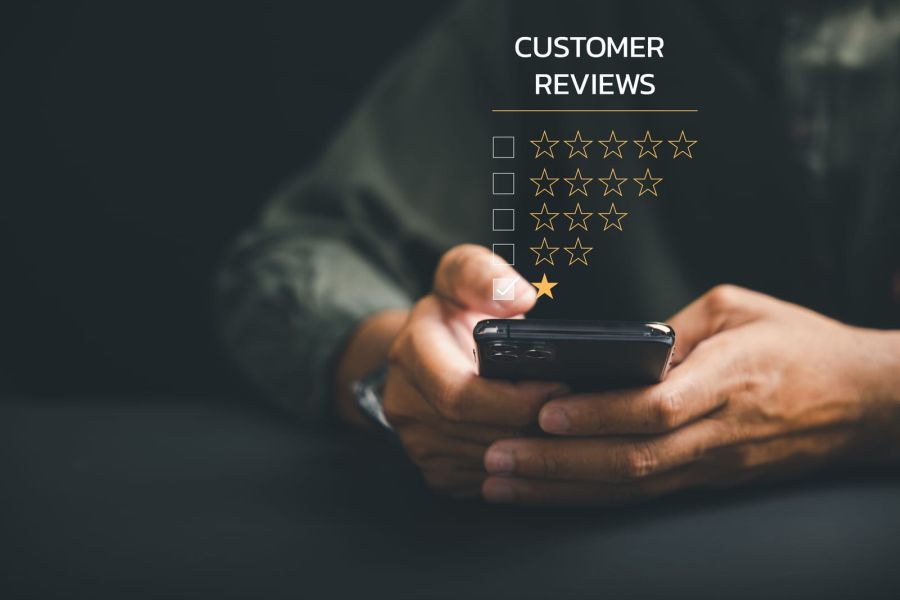Negative Consequences Of False Reviews. What the pros say
The power of online reviews cannot be underestimated, as they heavily influence the decisions of countless consumers daily. But what happens when these reviews are not genuine, and how can this impact businesses and customers alike? You’re in the right place to explore the negative consequences of false reviews as we break down the potential harm they can cause and how to tackle this issue.
Negative consequences of false reviews:
False reviews can have severe consequences for businesses, including loss of consumer trust, financial losses, harm to reputation, and potential legal complications. Customers may also be negatively impacted by wasted time and money and decreased trust in review platforms. To mitigate these effects, monitoring and promoting transparency are crucial.

Discover the adverse effects of false reviews on businesses and customers alike. Uncover the role these fabricated assessments play in misleading consumers, sullying reputations, and even causing businesses to shut down.
Read on to delve into the world of fake reviews, the motivations behind them, and why it’s essential to tackle this growing problem.
Contents
- 1 Adverse Effects of Inaccurate Reviews
- 2 Exploring the Detrimental Effects of Poor Reviews
- 3 The Significance of Untruthful Reviews Explained
- 4 The Legal Risks of Fabricated Reviews for Businesses
- 5 The Business Impact of Unfavorable Social Media Feedback
Adverse Effects of Inaccurate Reviews
• Impact on Businesses
False reviews can have serious implications for businesses, both large and small. One of the most significant consequences is the potential loss of consumer trust.
When potential customers read false negative reviews, they may become hesitant to patronize the business. This can lead to lost sales and revenue, which can be devastating for a small business.
In addition to financial losses, false reviews can also hurt business owners’ reputations. These reviews often spread quickly, especially in today’s digital world.
Negative reviews can easily be shared and spread across social media platforms and review sites, making it difficult for companies to recover from the damage. This can lead to long-term harm to a business’s brand and overall image.
Moreover, the time and resources spent addressing false reviews could be better spent elsewhere, such as improving products, services, or marketing efforts. Instead of focusing on growth and development, companies may find themselves constantly combating the impact of false reviews.
– Legal Complications
False reviews can also result in legal complications for businesses. Defamatory statements, or statements that are false and harm a person or business’s reputation, can be the basis for a defamation lawsuit. Defamation cases can be time-consuming and expensive for businesses to pursue, further impacting their bottom line.
To protect against legal issues related to false reviews, businesses may need to invest in monitoring their online presence more closely. This can include hiring additional personnel or purchasing software to track and manage online reviews.
• Impact on Customers
Another group impacted by false reviews is customers. False reviews can lead to wasted time and money for consumers who make decisions based on inaccurate information.
For example, a customer may choose to spend their money at a different establishment based on a false negative review. This could result in the customer receiving a subpar experience at the alternative business, which they may not have chosen if they had been able to make an informed decision.
On the flip side, customers may also be deceived by false positive reviews. They may choose to purchase a product or service based on glowing reviews that later turn out to be untrue. This can lead to dissatisfaction with the product or service, ultimately harming the consumer’s trust in the review system as a whole.
– Decreased Trust in Review Platforms
As false reviews become more prevalent, consumers are likely to become more skeptical of online review platforms. Research conducted by Harvard Business School found that fake user reviews can undermine the value and credibility of online review sites.
This can be particularly problematic for review sites that rely on user-generated content. If users cannot trust the reviews on a platform, they are more likely to turn elsewhere for information, rendering the platform useless.
• Mitigating the Impact of False Reviews
To address these negative consequences, both businesses and consumers must take proactive steps to mitigate the impact of false reviews.
– Businesses Should:
- Monitor online reviews closely and respond to any that appear suspicious or illegitimate.
- Report fraudulent reviews to the appropriate platform or site to have them removed.
- Encourage legitimate customers to leave honest, detailed reviews.
- Be transparent with customers about attempts to combat false reviews and any action taken.
– Consumers Should:
- Be critical of overly negative or positive reviews, and look for patterns that may indicate false reviewing.
- Read multiple reviews from a variety of sources before making a purchasing decision.
- Keep in mind that no business is perfect, and one negative review may not indicate a pattern.
- Report any reviews that seem suspicious to the relevant platform or site.
In conclusion, false reviews can have far-reaching consequences for businesses and customers alike. By being vigilant in monitoring reviews and promoting transparency, both parties can combat the harm caused by fraudulent feedback and foster a more accurate and reliable review ecosystem.
Exploring the Detrimental Effects of Poor Reviews
No matter the industry, bad reviews can wreak havoc on a business. In a world increasingly dominated by online communication, a single negative review can reach countless potential customers and significantly impact a company’s reputation.
Understanding the potential negative effects of bad reviews is crucial for businesses to know how to mitigate their impact and maintain a positive image.
• Damaged Reputation
Bad reviews have the power to damage a business’s reputation, both online and offline. A damaged reputation can make it difficult for a company to attract new customers and retain existing ones, resulting in potential financial losses.
In fact, a study by Harvard Business School revealed that a one-star decrease in a Yelp rating could lead to a 5-9% decrease in revenue. Therefore, it is essential for businesses to address negative reviews responsibly and take necessary measures to maintain a reputable image.
• Loss of Customers and Revenue
Negative reviews can directly impact a company’s bottom line by deterring potential customers from choosing their products or services.
With the prevalence of online review platforms such as Yelp or Google Reviews, customers heavily rely on others’ experiences to make informed decisions. One bad review can be enough to sway someone away from a business, leading to a lack of potential customers and subsequent loss of revenue.
• Hindered Business Growth
The growth of a business may be hindered by bad reviews, as they present an obstacle in attracting new customers and retaining current ones. This leads to stagnation in the customer base, limiting the potential for business expansion.
Furthermore, a business with a slew of bad reviews may find it challenging to foster partnerships with other companies or attract prospective investors due to a negative public image.
• Negative Impact on Employee Morale
Bad reviews can greatly affect employee morale, not just the business itself. Employees may feel disheartened by negative comments about their work, leading to decreased motivation and productivity.
Moreover, recruiting and retaining quality employees may prove difficult if a business is known for receiving bad reviews, as employees may be hesitant to associate with a company perceived poorly by the public.
• Limited Scope for Improvement
While occasional bad reviews can be valuable, providing businesses with actionable feedback for improvement, an abundance of negative reviews might hinder a company’s ability to evolve.
Customers may be less willing to offer constructive feedback if they perceive a business as consistently providing poor service, leading to the company being unable to identify areas for growth and improvement.
• Recommendations to Mitigate the Impact of Bad Reviews
While bad reviews can harm a business in several ways, it’s not all doom and gloom. Here are some recommendations to help businesses mitigate the negative impact of bad reviews and maintain a positive public image:
– Respond to Reviews Professionally
Take the time to respond professionally and politely to negative reviews, demonstrating that the business values customer feedback and is committed to resolving any problems that may have occurred.
This not only helps maintain a positive image but also increases the likelihood that customers will continue to patronize a business in the future.
– Encourage Positive Reviews
Happy customers tend to be less vocal than dissatisfied ones. Encourage satisfied customers to leave positive reviews by implementing feedback cards, email follow-ups, or on-site prompts. This helps balance out the negative reviews and restores credibility to the business.
– Learn From Negative Feedback
Analyze negative reviews and work towards identifying patterns, potential weaknesses, and areas for improvement. Then, use this feedback to enhance processes and correct any issues that may be driving customers away.
– Maintain Consistency in Quality and Service
Implement quality control and service protocols, ensuring consistent customer experiences across the board. This helps reduce the likelihood of negative reviews and fosters customer loyalty.
– Monitoring and Reputation Management
Keep a close eye on online reviews and use reputation management tools to stay informed about the online image of the business. This allows for timely response to negative feedback and taking necessary actions to maintain a positive public perception.
In conclusion, bad reviews can significantly impact businesses in various ways.
However, by actively addressing negative feedback, encouraging positive reviews, and continuously working on improving service and products, businesses can mitigate the negative impact of bad reviews, maintain a positive public image, and continue to thrive.
The Significance of Untruthful Reviews Explained
False reviews, whether positive or negative, can have a significant impact on businesses, consumers, and even online marketplaces. These reviews can not only mislead customers but also damage the reputation of a business and undermine the trust that consumers place in online review platforms.
• Unreliable Online Shopping Experience
As the number of online shoppers increases, it has become crucial for customers to rely on product reviews to make informed decisions. A study conducted at Harvard Business School found that a one-star increase in ratings led to a 5-9% increase in the business’s revenue.
However, when customers make decisions based on false reviews, it leads to dissatisfaction and an unreliable online shopping experience. This can deter consumers from shopping online, leading to decreased trust in e-commerce platforms.
• Tarnished Business Reputation
False reviews can significantly damage a business’s reputation. Positive fake reviews might initially boost sales, but the quality of the product or service may not live up to the expectations set. Consequently, this results in a disappointed customer and a negative genuine review.
On the other hand, negative fake reviews can turn potential customers away and harm a business’s bottom line. A study from the American Marketing Association revealed that negative reviews could cause a revenue loss of up to 9%.
• Legal Consequences
Entities responsible for disseminating false reviews can face legal consequences. In several countries, authorities have developed regulations to combat deceptive reviews, and individuals or businesses found guilty of posting fake reviews can be liable for substantial fines.
For example, the Federal Trade Commission in the United States has the authority to take legal action against false reviews under the FTC Act, which prohibits false endorsements and advertisements.
• Unfair Competition
False reviews can create an unfair playing field for businesses, with some investing in fake reviews to gain an edge over competitors. The authenticity of reviews is a critical factor that helps customers differentiate among market players.
By manipulating reviews, dishonest businesses not only mislead customers but also make it difficult for honest businesses to win their trust.
• What Can Be Done to Address False Reviews?
– Increased Transparency and Verification
One approach to combating false reviews is to increase transparency and verification of user reviews. Online marketplaces could require users to provide proof of purchase before posting a review or implement stricter authentication measures to ensure that reviews come from legitimate customers.
– Improved Algorithms and Detection Methods
Machine-learning algorithms can be developed to identify patterns, suspicious behavior, or language indicative of fake reviews. By continuously refining these algorithms, online platforms can detect, flag, and remove false reviews more effectively.
– Educating Consumers
Informing consumers about the existence and effects of false reviews can encourage them to be more discerning when reading reviews. By understanding the characteristics of fake reviews, such as extreme ratings or generic language, consumers can make better-informed decisions.
– Legal Action
Taking strict legal action against the responsible entities can serve as a deterrent to those considering posting false reviews. Ensuring robust protection under the law and strict enforcement can help curb the spread of misinformation through false reviews.
• In Conclusion
False reviews can significantly impact all stakeholders in the e-commerce ecosystem. From undermining trust in the online marketplace to damaging business reputations and even legal consequences, it’s clear that false reviews cannot be ignored.
By adopting stringent measures to detect and remove deceptive reviews, increasing transparency, and educating consumers about the issue, we can foster a more honest, reliable, and fair online marketplace for all.
The Legal Risks of Fabricated Reviews for Businesses
Fake reviews can be a significant problem for both consumers and businesses alike. Not only can they create a skewed perception of a company and its products or services, but they can also lead to legal repercussions for the business itself.
• Legal Actions Against Fake Reviews
A growing number of countries and jurisdictions are taking legal action against companies that engage in fake reviews. These actions may result from investigations by:
- Consumer protection agencies: Certain government agencies are tasked with ensuring businesses adhere to fair trading practices and do not deceive consumers. These agencies may investigate and bring enforcement against companies for posting, soliciting, or facilitating fake reviews. Examples of such agencies include the Federal Trade Commission (FTC) in the United States and the Competition and Markets Authority (CMA) in the United Kingdom.
- Private litigants: Independent of government enforcement, individuals and competing companies may also bring lawsuits against businesses that engage in posting or facilitating fake reviews. These lawsuits may involve claims of false advertising, unfair competition, and tortious interference.
– Examples of Legal Actions
There have been several prominent cases in recent years involving legal actions against businesses for fake reviews:
- In 2013, the New York Attorney General reached a settlement with 19 companies that had engaged in the practice of producing fake online reviews. These settlements resulted in over $350,000 in penalties for the companies involved.
- In 2015, Amazon filed a lawsuit against over 1,000 individuals who offered to post fake reviews on the platform, which led to significant damages being awarded to Amazon.
- In 2016, the CMA took enforcement action against several businesses that had utilized fake reviews to manipulate their online reputations. In one case, a PR and marketing firm agreed to pay over 125,000 in penalties for posting bogus reviews.
• Financial Consequences and Reputation Damage
Besides the legal consequences of engaging in fake reviews, companies may also experience financial losses and reputational harm as a result. When consumers become aware of a business’s false recommendations, they may lose trust in that company, which can lead to a drop in sales and customer loyalty.
Additionally, many online review platforms, such as Google, Yelp, and TripAdvisor, have implemented strict policies against fake reviews.
Violating these policies may result in penalties such as having the business’s profile flagged, suspended, or even permanently banned from the platform, further harming the company’s online presence and reputation.
• Recommendations for Avoiding Fake Review Trouble
To minimize the risk of legal consequences and reputational damage, companies should take the following steps in regard to online reviews:
- Implement a clear review policy: Clearly outline the company’s commitment to authentic, transparent reviews both internally and externally. This policy should underscore the importance of not soliciting, encouraging or rewarding fake reviews in any way.
- Train employees and partners: Ensure all team members, including third-party vendors and marketers, understand the company’s review policy and are aware of applicable laws and regulations.
- Engage with customers: Encourage satisfied clients to leave genuine reviews on reputable platforms. This can be done through follow-up emails, in-person conversations, or by providing links to popular review sites, but companies should refrain from offering incentives for reviews as this may also pose legal risks.
- Monitor online reviews: Regularly track the company’s online reviews to identify and address any potential fake or fraudulent content. Many platforms offer mechanisms for reporting suspected fake reviews, which may lead to their removal.
- Seek professional advice: If in doubt about the legality or propriety of a company’s review practices or if facing potential legal action, consult with legal counsel experienced in consumer protection, advertising, and unfair competition laws.
In conclusion, fake reviews can result in substantial legal repercussions, financial consequences, and significant reputation damage for businesses.
To avoid these negative outcomes and maintain a trustworthy online presence, companies should take proactive steps to ensure the authenticity and transparency of their customer reviews.
The Business Impact of Unfavorable Social Media Feedback
In today’s digital age, the power of social media and online reviews cannot be underestimated. Negative reviews, in particular, can have a significant impact on a business, affecting customer perception, online reputation, and even revenue.
• The Impact of Online Reviews on Customer Decisions
Studies have shown that more than 80% of consumers rely on online reviews to make purchasing decisions, with up to 94% choosing to avoid a business with negative reviews (source: Inc.com).
With such high stakes associated with online reviews, it is crucial for businesses to understand the repercussions of negative social media reviews and take appropriate action to mitigate the potential consequences.
• Loss of Confidence and Trust
A negative review can cause potential customers to lose confidence in and trust in a business. Depending on the severity of the complaint, some customers may begin to question the credibility of the business, which can deter them from making a purchase or seeking services.
Gaining trust in today’s competitive market is already challenging, and negative reviews make this task even more difficult.
• Decreased Customer Loyalty
Negative reviews can also impact customer loyalty. If loyal customer comes across a scathing review, they may start doubting their previous positive experiences with the business.
Furthermore, when customers experience poor service or product quality that aligns with the negative reviews they’ve read, their loyalty diminishes, making them less likely to return to the business.
• Reduced Online Visibility
Search engines like Google take into account customer reviews when ranking businesses online. A business with a high number of negative reviews may experience a decrease in its online visibility, leading to a drop in website traffic and, potentially, reduced sales.
It is important for businesses to maintain a healthy online presence and reputation to ensure better rankings in search results.
• Financial Consequences
Negative reviews can ultimately lead to decreased sales and financial losses. A Harvard Business Review study found that a drop by 1-star in a business’s Yelp rating is associated with a 5-9% decrease in revenue (source: Harvard Business Review).
When potential customers are turned off by negative reviews, it leads to reduced business, which can have dire consequences on a company’s bottom line.
• Tips to Handle Negative Social Media Reviews
Although the impact of negative reviews can be daunting, business owners can take steps to address these reviews and minimize the damage. Here are some recommendations:
– Respond Professionally and Timely
Acknowledge the negative review, and apologize sincerely for any inconvenience caused. Address the issue specifically, and offer a solution, if possible. A prompt and professional response can demonstrate the business’s commitment to customer satisfaction and mitigate potential damage to its reputation.
– Encourage Satisfied Customers to Leave Reviews
The more positive reviews a business has, the less significant the negative reviews become. Encourage satisfied customers to share their experiences on social media, which can help balance the overall review profile of the business.
– Learn and Improve
Negative reviews can serve as crucial feedback. Use them as an opportunity to identify areas of improvement and take actionable steps to address these issues. This can improve customer experience in the future and may reduce the likelihood of additional negative reviews.
– Use Review Management Tools
Several online tools, such as Reputation.com or ReviewTrackers, are available to help businesses monitor and manage their online reviews. These tools can aid in identifying negative reviews more quickly, allowing businesses to address them more effectively and efficiently.
In conclusion, the impact of negative social media reviews on businesses can be substantial, affecting aspects such as customer perception, loyalty, online visibility, and revenue.
By employing the right strategies, however, businesses can proactively handle these negative reviews, minimize their impact, and protect their online reputation.







